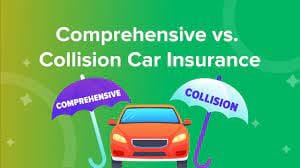When protecting your vehicle, getting through the complexities of insurance options can be overwhelming. Among the various choices, two prominent ones stand out: collision insurance and comprehensive insurance.

Both aim to shield you from financial burdens arising from unexpected mishaps, yet they differ significantly in coverage and scope. So, how do you decide which one suits your needs best? Let’s compare collision and comprehensive insurance to help you make an informed choice.
Understanding Comprehensive and Collision Insurance
Comprehensive insurance is a form of security that protects against several potential risks beyond collisions. It covers damages often caused by natural calamities like earthquakes, floods, and storms and man-made incidents like theft, vandalism, or fire.
This comprehensive coverage goes beyond just repairing collision-related damages, which gives you mental peace in many scenarios.
Collision insurance focuses on one specific type of incident: collisions. Whether the collision is with another vehicle or an object like a pole or a wall, collision insurance covers damages caused by these accidents.
It’s a more focused vehicle insurance policy, mostly emphasising repairing or replacing the vehicle damaged in the collision.
Collision vs. Comprehensive – Key Differences to Consider
Choosing the right vehicle insurance policy is very important, as it helps safeguard your prized possession against unexpected mishaps that happen on the road.
Among the various options available, collision and comprehensive insurance are prominent choices that offer distinct coverage benefits.
Let’s get through the complexities of collision versus comprehensive insurance to help you find the perfect fit for your vehicle protection needs:
| Aspect | Comprehensive Insurance | Collision Insurance |
| Coverage Scope | Comprehensive insurance covers many risks, including natural disasters such as earthquakes and floods and man-made incidents like theft and vandalism. | Collision insurance is narrowly focused, covering damages from collisions, whether with other vehicles or stationary objects such as poles or walls. |
| Cost Considerations | Comprehensive insurance tends to be more expensive due to its broader coverage, with premiums varying based on location, vehicle type, and insured amount. | Collision insurance typically has lower premiums because it offers limited coverage, making it a more budget-friendly option, especially for cost-conscious individuals. |
| Policy Availability | In certain regions, comprehensive insurance is offered as a standalone policy, while in others, it’s bundled with collision coverage, providing policyholders with the flexibility to choose between collision-only or comprehensive coverage. | Collision insurance is available separately in regions where it’s offered, allowing policyholders to focus solely on coverage for damages resulting from collisions without the additional coverage provided by comprehensive insurance. |
| Add-On Coverage | Comprehensive insurance often includes additional perks and add-ons such as roadside assistance, zero depreciation, and engine protection, enhancing policyholders’ overall coverage and benefits. | Collision insurance generally does not offer as many add-ons or perks as comprehensive insurance, focusing primarily on covering damages resulting from collisions without additional enhancements. |
| Suitability | Comprehensive insurance is ideal for individuals seeking maximum protection against various risks beyond collisions, particularly in areas prone to natural disasters or high rates of theft. It provides comprehensive peace of mind on the road. | Collision insurance is suitable for those primarily concerned about damages resulting from collisions and looking to keep insurance costs lower. It is a crucial choice for budget-conscious individuals focused on specific coverage needs. |
Making the Right Choice – Which is the one for you?
Choosing between collision and comprehensive insurance should be done considering various factors based on your budget, driving habits, and the risk you’re comfortable with. Here are some pointers to consider:
- Comprehensive Insurance
Plan your coverage with a comprehensive one especially if you aim for maximum protection against a wide range of risks beyond collisions. It is perfect for those living in areas prone to natural disasters.
- Collision Insurance
If you’re primarily concerned about damages caused by collisions, collision insurance is perfect for keeping your insurance costs lower. It’s a more budget-friendly option, giving you a focused plan when needed.
Conclusion
There’s no one-size-fits-all solution when choosing the right types of vehicle insurance. The choice between collision and comprehensive insurance hinges on your needs, preferences, and circumstances.
By understanding each policy type’s nuances and evaluating your risk profile, you can make a well-informed decision that ensures your peace of mind on the road.
Whether you opt for the comprehensive safety net or the targeted protection of collision insurance, investing in adequate vehicle insurance by trusted providers is a prudent decision that safeguards your vehicle and financial well-being against unforeseen adversities.
